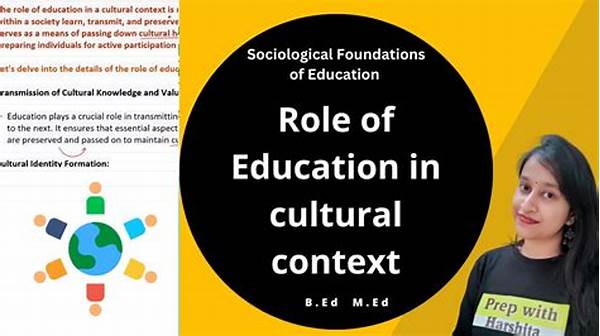Education is the lifeline of our society. It’s the golden ticket to a prosperous world, yet without culture, it’s like a pizza without the toppings – pretty bland. Culture breathes life and color into education. It shapes how we see the world, how we process knowledge, and how we pass it down to the next generation. Recognizing the role of culture in education is crucial. It’s about more than just blending subjects or school activities with cultural flair; it’s about preparing students to be well-rounded global citizens, able to slip into any cultural context and thrive.
Read Now : Popular Music Playlist 2025
The Impact of Culture on Learning
Imagine learning about the Roman Empire without discussing Italian culture, or studying the American Civil Rights Movement without touching upon African American heritage. Yeah, right? Snooze fest. Culture makes history come alive and math a universal language. The role of culture in education enhances not just content but context. It provides a framework within which students understand not just what they’re learning, but why it matters. By incorporating cultural diversity, education becomes more engaging and relatable. Kids will ditch the “when will I ever use this stuff” mentality and start to see real-world connections. After all, it’s this blend of educational content and cultural perspective that fosters inclusivity, promotes empathy, and builds a more interconnected world.
Why Culture Matters Big Time in Schools
1. Global Awareness: The role of culture in education opens eyes to the wider world, encouraging kids to appreciate a melting pot of traditions.
2. Inclusiveness: Culture-friendly education is like that popular kid who makes everyone feel welcome. It champions diversity and belonging.
3. Communication Skills: With culture in the mix, kids aren’t just learning a language; they’re getting the full experience, making it easier to vibe with diverse folks.
4. Critical Thinking: Having cultural context in lessons makes students question norms, creating smarty-pants who challenge the status quo.
5. Identity Building: The role of culture in education helps students to explore their roots and build a strong sense of self—‘cause knowing where you’re coming from is all the rage.
Culture as a Tool of Empowerment in Classrooms
Education is way more than textbooks and exams. It’s about shaping young minds into confident, worldly-wise adults. Culture is that secret sauce that takes education from basic to top-notch. Imagine a classroom buzzing with students learning not just the “what” and “how,” but the “why” through culture’s eyes. The role of culture in education equips learners with a toolkit to face real-life challenges and connects them to their own stories and those of others. It’s about drawing strength from one’s heritage and building a bridge that links the past with the future, creating leaders who embrace diversity and advocate for justice. Culture’s impact on education isn’t just transformational; it’s revolutionary.
Read Now : Artistic Expression In Dance Fusion
Making Education Culturally Relevant
Drip-feeding culture into the education system isn’t just about ticking boxes or being woke. It’s about breathing fresh life into learning environments, where students aren’t just passive observers but active participants. The role of culture in education makes subjects pop by weaving in narratives and traditions that resonate. Suddenly, every lesson isn’t just a chore but a story with characters like them. It flips the script from dull to dope, sparking curiosity and kindling passions. In the end, a culturally rich education isn’t just an option—it’s the golden standard for crafting a future where everyone has an equal shot at success and happiness.
Culture: The Bedrock of Lifelong Learning
The role of culture in education isn’t just a phase, fam; it’s a lifetime gig. From toddlerhood to grown-up hustles, culture is that ever-present mentor guiding the way. Imagine kids who rock up to class, pumped to unearth the stories, languages, and customs that make up our intricate planet. They grow into adults who’ve got the cultural savvy to navigate this spicy ol’ world effortlessly. Education and culture together build bridges, not walls. They’re the dynamic duo ensuring that our shared future is less about “us vs. them” and more about community and unity.
Culture’s Influence Beyond the Classroom
Let’s be real: the role of culture in education goes beyond pencils, paper, and pop quizzes. It’s about vibe and essence. Culture infuses the very air we breathe—shaping dialogues, flipping traditional narratives, and inspiring fresh ideas. Students equipped with cultural insights don’t just pass tests; they change the world. They’re ready to question outdated perspectives and come up with innovative solutions that breakdown barriers and stereotypes. Now, isn’t that a world we all wanna live in?
Wrapping Up the Cultural Influence on Education
Summing it up, the role of culture in education is a game-changer. Integrating cultural content into school curriculums is like sprinkling fairy dust—turning the mundane into the magical. With more culturally literate souls in the mix, the world becomes a cozier, more inviting place. Everyone’s unique backstory is celebrated and the tapestry of education becomes richer and more vibrant. From classrooms filled with color and diversity, we foster minds that are open, accepting, and hungry to innovate. In the end, if education is the key to the world, then culture is the hand that turns it.
